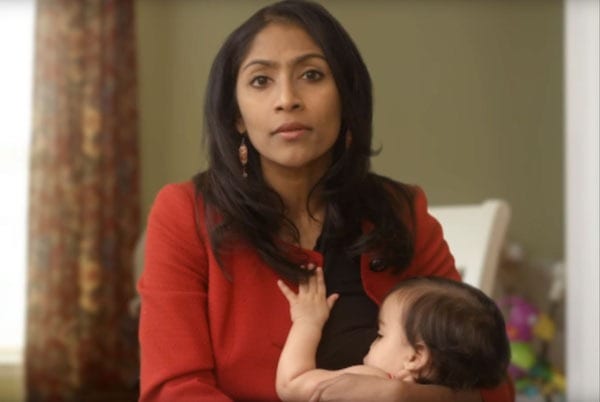Even better, a good number are actively promoting their credentials as a young mother in their campaigns.
It’s a a trend detailed in The Atlantic this week (thanks to our regular contributor Kristine Ziwica for pointing it out). The Atlantic shares a number of key examples including that of Krish Vignarajah, who featured shots of herself breastfeeding her baby daughter in a 30 second video for her Maryland gubernatorial campaign. She signed off by saying: “I’m a mum. I’m a woman. And I want to be your next governor.”
Another example is from M.J Hegar, a Texas congressional candidate who uses a series of doors in her video campaign detailing her many work and life hats, including her family, her time serving in Afghanistan flying helicopters, obstacles she’s faced being heard, and her campaign for congress . The doors symbolise the fact that her whole life she’s been “opening, pushing, and sometimes kicking my way through”.
Meanwhile, Senator Tammy Duckworth, who became the first US senator to give birth while in office is now regularly seen working on Capital Hill with her baby in her lap.
As The Atlantic writes:
Moms are not only seeking political seats, but seeking them explicitly, and proudly, as moms; in this year’s election cycle, motherhood has become an asset to be flaunted in progressive campaigns, resolving a decades-old tension for women seeking to enter electoral politics.
It’s a trend I hope to see further flow into Australian politics where, for too long, male politicians have been able to use their children (especially their daughters) as assets to make them seem well-rounded, supportive of women and working parents, and as having a better understanding of issues affecting their constituents. That’s still not necessarily the case for female politicians.
Right now, women in ministerial positions are less likely to have children than their male counterparts (although admittedly the sample size of women in such roles is too small to present anything meaningful here). This is not at all to suggest that women should have to have children to be in politics or are any way more worthy of political positions if they do have children, but it does indicate there a plenty of impediments standing in the way of women entering Parliament with young children — and that could mean a portion of the population is being underrepresented.
We’ve seen some powerful examples of change, including from former Senator Larissa Waters, who gave a speech in Parliament last year while breastfeeding her daughter. The video went viral, positioning Australia — fleetingly — as particularly progressive when it comes to women in politics.
Also Kelly O’Dwyer is the mother of young children and has had a number of promotions in recent years, including being named Minister for Women in late 2017, shortly after the birth of her second daughter.
And earlier this year Tim Hammond’s decision to step down from his electorate of Perth to spend more time with his family demonstrated that managing parliamentary responsibilities (especially when it includes extensive travel, as in Perth to Canberra) with parenthood is not a challenge facing women of young children alone.
In this weekend’s ‘Super Saturday’ by-elections occurring across Australia, a number of female candidates are visibly highlighting their role as mothers.
Former Labor MP Susan Lamb, who is running to claim back her seat of Longman, lists her parenting credentials at the top of her bio on her website, stating that “having raised a family in the local area” she understands firsthand the challenges families face. Rebekha Sharkie notes her years of experience getting involved in “school, sports and other community organisations” along with her time juggling office work with motherhood.
And Justine Keay, who is campaigning to win back her Tasmanian seat of Braddon, describes herself in the first line of her bio as “the proud mum to three young boys.”
Labor MP Terri Butler recently told me that she wants to see more mothers of young children in Parliament, as they’re able to give a much better perspective on many of the issues affecting working mothers right now.
But given the current geopolitical environment, it’s about more than that now.
Globally, we’re seeing a rise in ‘strongman politics’, with macho leadership in response to populism coming from Donald Trump, Vladimir Putin, Bashar Al-Assad in Syria, the rise of the authoritarian right in parts of Europe and Xi Jinping’s ‘new era’ in China, where he’s successfully removed term limits on his leadership. As Tony Walker writes today, “genuine liberal democrats are in retreat as a populist tide laps at their doors” — pointing to France, Germany and Britain as examples.
“What Australia and these countries lack is a Trump, but anything is possible in an emerging strongman era,” writes Walker.
The best response to strongman politics could just be the rise of strong women. Mothers are certainly well positioned to proudly demonstrate their strength.


